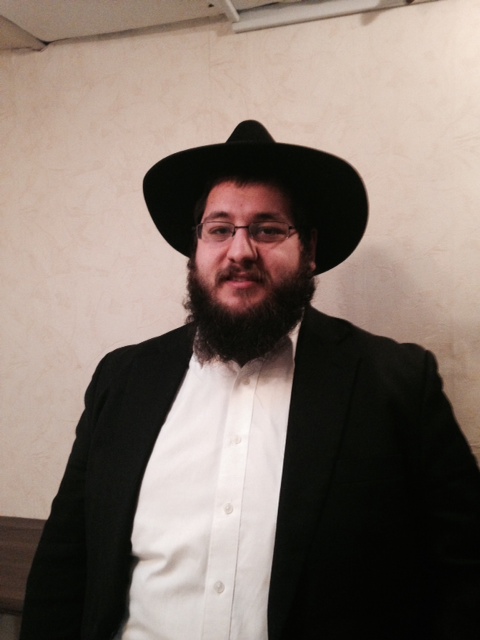Mitzvah Tanks bring Judaism to Wall Street and beyond
Financial District, NEW YORK--It’s lunchtime on a gray Friday afternoon and food trucks line the Financial District streets, catering to hungry businessmen and women. On the corner of Wall St. and William St., loud niggunim—traditional Hasidic vocal music—echoes from an RV bearing the sign "Mitzvah Tank." Outside, three young men with black hats atop their curly ear locks hand out literature, asking those passing by whether they are Jewish or not.
The “tank” is nothing more than a small, average RV, lacking the fancy signs or paint job of the nearby orange LOVE Coffee truck. Mitzvah Tanks, now in their 40th year of operation, are operated by the Chabad-Lubavitch sect of Hasidic Orthodox Judaism.
“The idea is for Jews that don’t have the chance to go to the synagogue to have somewhere to go,” explains Mendy, a Yeshiva student and volunteer. “It’s a mobile synagogue.” The group desires to see Jews return to their faith and practice mitzvahs (“commandments” for Jews found in the Torah)—even if it means bringing the mitzvahs to them.
“Unfortunately, many people are not familiar with Jewish traditions,” says Yossi, another Yeshiva student and volunteer. Even those who are familiar with Jewish traditions aren’t always receptive.
“They’re not telling you everything!” interrupts a man. “They’re not telling about someone named Jesus—Jesus Christ.” The bystander explains that he is a lectern at a nearby Catholic church and regularly speaks with visitors to the Mitzvah Tank.
“I come out here to haggle these guys,” he says.
Despite their military-esque “tank” name, the group is peaceful when faced with backlash.
“We ‘conquer’ darkness with light,” explains Mendel, a rabbi on board the Mitzvah Tank. “It’s like the passage in Jeremiah—weapons will be replaced with plow heads.”
Inside, the tank is divided into two sections. As visitors board, they come into a welcome area where they can perform mitzvahs: men can wear teffilin and recite passages from the Torah, while women are given Shabbat candles to bring in the Sabbath with light.
Beyond the entryway is a tiny living room, where a group of men sits discussing the Torah. Two yeshiva students wear solemn Orthodox attire, while another man wears a relaxed sports jacket, slacks and a skullcap. Another man sports more casual clothing, an eye-patch and a New York Yankees baseball cap, nodding his head as he fidgets with an unlit cigarette.
As this visitor steps out for a smoke, the rabbi explains more about the Chabad-Lubavitch community. “Chabad”—a Hebrew acronym for wisdom, understanding and knowledge—represents both an organization and branch of Hasidic Judaism that is centered on various rebbes. Rebbes (not to be confused with rabbis, Jewish men who have studied the Torah), he says, are holy men with a unique relationship with God—men like Abraham, Moses and King David in the Jewish tradition.
“The Rebbe—,” starts Rabbi Mendel, before a long pause. He glances up at a painting on the Mitzvah Tank wall of the movement’s most recent Rebbe, Menachem Mendel Schneerson. “The Rebbe is first and foremost a purely righteous person. Totally righteous.”
Rebbe Menachem Mendel Schneerson was the leader of the Chabad-Lubavitch movement and lived at 770 Eastern Pkwy. in Brooklyn, which is now the headquarters of the movement. The Rebbe passed away in 1994, but left a legacy of schools and synogogues and a large community of Chabad-Lubavitchers behind, fully dedicated to continuing his work of reaching out to Jewish brethren.
“The outlook of Chabad over other sects, other branches, is love for fellow,” says Rabbi Mendel. “Hasidism as a whole is about becoming close to G-d, helping others. What makes Chabad distinct is emissaries. The way to serve G-d is helping others.”
What does “helping others” look like for those of us that are not Jewish? The group encourages non-Jewish people to practice “the seven Noahide laws”—laws laid out by Noah (yes, Noah’s Ark Noah), whose laws they believe apply to all people, Jewish or not. The group is primarily oriented toward Jews, but not with the intentions of excluding others.
“It’s not selfish—it’s like your family,” Rabbi Mendel says. “When you are able to devote time to help your family, your community or your state, you focus on your family first.”



